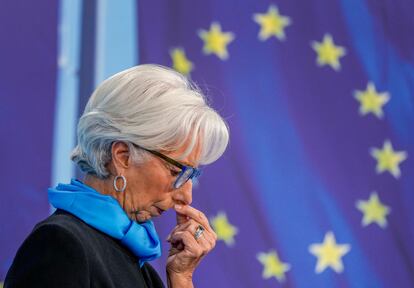Europe’s central bank backs big rate hike despite banking chaos
The ECB raised rates by half a percentage point on Thursday, underlining its determination to fight high inflation

The European Central Bank (ECB) carried through with a large interest rate increase on Thursday, brushing aside predictions it might dial back as U.S. bank collapses and troubles at Credit Suisse fed fears about the impact of higher rates on the global banking system.
The ECB hiked rates by half a percentage point, underlining its determination to fight high inflation. In a post-meeting statement, the bank called the banking sector in the 20 countries using the euro currency “resilient,” with strong finances.
It says it’s “monitoring current market tensions closely and stands ready to respond as necessary to preserve price stability and financial stability in the euro area.”
Analysts had said the ECB might make only a quarter-point increase given the amount of market turmoil. But instead of that, the ECB maintained its original plan and instead promised that “liquidity” will be available if necessary to respond to any hypothetical crisis.
At a news conference, ECB head Christine Lagarde said that “the euro area banking sector is resilient, with strong capital and liquidity positions. In any case, the ECB’s policy toolkit is fully equipped to provide liquidity support to the euro area financial system if needed.”
Last week Lagarde had said that it was “very likely” the bank would raise its benchmarks by a half-percentage point, part of a series of rapid rate hikes aimed at getting inflation down from 8.5% — far above the bank’s target of 2%.

But that was before Silicon Valley Bank in the U.S. went under last week after suffering losses on government-backed bonds that fell in value due to rising interest rates. Then, globally connected Swiss bank Credit Suisse saw its shares plunge this week and had to turn to the Swiss central bank for emergency credit.
The troubles at Credit Suisse dragged down the shares of stalwart European lenders such as Deutsche Bank, Commerzbank, BNP Paribas and Societe General on Wednesday. Bank shares recovered Thursday after news of the credit help for Credit Suisse.
Analysts say the share selloff was fed by investor fear that banks took added risks to increase investment returns during years of very low interest rates and some may have failed to safeguard themselves against those holdings turning sour as rates rise.
Similar questions are being raised about what the U.S. Federal Reserve will do at its rate meeting next week.
Fed Chair Jerome Powell said only last week that the ultimate level for rates would be “higher than previously anticipated,” leading some analysts to predict the Fed would raise by a half-point after slowing the pace to a quarter-point in February. Since then, expectations shifted back toward a quarter-point.
European finance ministers have said that their banking system has no direct exposure to the failures of Silicon Valley Bank and others in the U.S. Analysts say the European banking system instituted wide-ranging safeguards after the global financial crisis that followed the collapse of U.S. investment bank Lehman Brothers in 2008 and led to 600 billion euros in taxpayer-funded bailouts of European banks in 2008-2012.
The sweeping post-Lehman banking reforms enacted by the European Union forced banks to hold thicker financial cushions against losses and put the biggest banks under the watchful eye of the ECB, taking them away from national supervisors who were considered to have turned a blind eye as problems built up at their home banks.
European banks also observe international rules that raised the amount of ready cash they had to keep on hand to cover deposits. Smaller U.S. banks were exempt from that rule; Silicon Valley was one of them.
But all that hasn’t kept the U.S. banking blow-up from looming large for the ECB this week. New evidence of concern flared Wednesday when shares in European banks fell 8.4%. Credit Suisse, the No. 2 Swiss bank, saw its shares plunge as much as 30% after its biggest investor, Saudi National Bank, said it could not provide more financial support.
Credit Suisse, whose troubles predate the collapse of Silicon Valley Bank, then turned to the Swiss National Bank for up to $54 billion in credit to stabilize its finances, sending its stock soaring as much as 30% on Thursday. That brought wider bank stocks back up.
Nicolas Veron, a banking expert at the Bruegel think tank in Brussels, said European banking supervision is much stronger than in 2007 when banks were “dramatically undercapitalized and poorly supervised.” He also said that the ECB has been carefully studying the impact of higher rates on its banks.
“Having said that, if we had had our conversation a week ago, I would have expressed confidence in U.S. banking supervision as well,” he said, calling the U.S. bank collapses evidence of “a pretty inexplicable supervisory failure” by the U.S. Federal Reserve.
“And so because the Fed has such status, this creates a kind of doubt across the board on the quality of supervision and whether what we think we know about banks is actually right.”
Sign up for our weekly newsletter to get more English-language news coverage from EL PAÍS USA Edition
Tu suscripción se está usando en otro dispositivo
¿Quieres añadir otro usuario a tu suscripción?
Si continúas leyendo en este dispositivo, no se podrá leer en el otro.
FlechaTu suscripción se está usando en otro dispositivo y solo puedes acceder a EL PAÍS desde un dispositivo a la vez.
Si quieres compartir tu cuenta, cambia tu suscripción a la modalidad Premium, así podrás añadir otro usuario. Cada uno accederá con su propia cuenta de email, lo que os permitirá personalizar vuestra experiencia en EL PAÍS.
¿Tienes una suscripción de empresa? Accede aquí para contratar más cuentas.
En el caso de no saber quién está usando tu cuenta, te recomendamos cambiar tu contraseña aquí.
Si decides continuar compartiendo tu cuenta, este mensaje se mostrará en tu dispositivo y en el de la otra persona que está usando tu cuenta de forma indefinida, afectando a tu experiencia de lectura. Puedes consultar aquí los términos y condiciones de la suscripción digital.








































